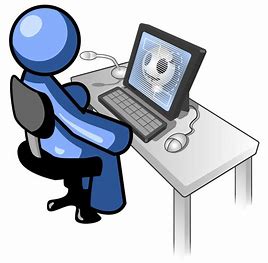
By Stephanie

As a Web Accessibility Consultant and Analyst, I would like to help others around the world understand the importance and value of Web accessibility and usability for all. This page will include lots of information about Web Accessibility and many of the Blogs I have written.
Let’s get Started

Web Accessibility
Is your website ADA compliant?
Stephanie’s focus is on inclusiveness for all.
Stephanie Bolinger is a leader in web accessibility and she leverages that to help you lead your industry. She offers customized WCAG 2.1 and ADA compliance testing as well as can recommend highly skilled Designer and Developer services to meet your needs.
When looking for an accessibility professional, it makes sense to partner with a professional that has the expertise to help you succeed and who is dedicated to ensuring accessibility compliance. Stephanie Bolinger combines expertise, experience and efficiency to offer end-to-end accessibility services covering both conventional and emerging technologies with her team or yours.

Stephanie works with leading corporations, trade associations, non-profits, foundations, educational institutions and government entities to ensure that their products, websites, documents and mobile applications are accessible for people with disabilities. She works with clients across industry verticals including financial services, healthcare, manufacturing, hospitality, and education.
Accessibility Law
What are web accessibility laws?
Title III of the Americans with Disabilities Act (ADA) prohibits discrimination “on the basis of disability in the activities of public accommodations.” While the law was enacted primarily to focus on obstacles at physical locations, it’s being applied to websites as well.
Title II of the ADA applies to state and local governments. Federal agencies, government contractors, and programs that receive federal funding are also subject to Section 504 and Section 508 of the Rehabilitation Act of 1973, amended to address online resources.
If a website is inaccessible to those with disabilities, the business could be required to redesign the website, incur monetary damages, and pay attorneys’ fees.
When it comes to US web accessibility standards, US businesses are on notice.
Who does accessibility law benefit?
61 million Americans report having a disability that affects major life activities according to the Center for Disease Control. That works out to 25% of all adults living in the U.S. The CDC classifies disabilities as those affected by these categories:
- Mobility
- Vision
- Hearing
- Cognition
- Independent Living
- Self-Care
Web accessibility laws and US web accessibility standards are aimed at making sure anyone suffering from these disabilities have the same right of access as non-disabled.
Who is required to follow these laws?
Generally speaking, any business that is public-facing is required to comply with web accessibility standards and guidelines. The Americans with Disabilities Act applies to private businesses in one of these 12 categories:
- Lodging
- Businesses serving food or drink
- Entertainment or exhibition
- Public gathering
- Sales or rental businesses
- Service establishments
- Public transportation
- Public display
- Recreation
- Education
- Social services
- Exercise or recreation
The ADA applies to state and local governments in addition to
Section 504 and Section 508 of the Rehabilitation Act of 1973, which was amended for online resources.
How are these laws enforced?

The federal government, through the Department of Justice, can sue in court for enforcement of ADA laws. It can seek changes and civil penalties. More commonly, businesses are the target of class action suits. Domino’s, Netflix, and Target all faced lawsuits by advocacy groups over the accessibility of their websites, forcing changes to company practices.
Class action suits for ADA violations are on the rise. 2,285 were filed in 2018 representing an increase of 181% over it’s previous year. Most cases settle out of court with companies agreeing to make changes to its website.
Compliance
How to comply with U.S. web accessibility standards
Court rulings have favored businesses, however, that followed the Web Accessibility Initiative (WAI) published by the World Wide Web Consortium (W3C). The Web Content Accessibility Guidelines (WCAG) provide a list of recommendations to make online content more accessible to those with disabilities. It covers four main areas.
Perceivable
All users, including those with impaired vision, should be able to see and read your website.
Operable
Websites should be responsive and easy to navigate for all users across multiple browsers and mobile devices
Understandable
Websites should be organized in a way that’s easy to use and use language that most customers can understand.
Robust
Websites should integrate with tools (Assistive Technology or AT) that are used by users with disabilities.
Stephanie is here for you

Stephanie monitors current market trends in the accessibility world to ensure she is using the most popular assistive technologies – and those that are growing in popularity – to ensure your website can be used by all. And while she test WCAG 2.1 AA and AAA and ADA Section 508, she provides a higher testing standard than mere compliance when she audits a site. Stephanie provides usability advice and offers enhancement recommendations to ensure the site is not only compliant, but also a pleasure to use.
Stephanie works with clients to create tailored solutions to meet their goals — one-size-fits-all solutions are inadequate. Her small contracted client base allows her to be nimble and responsive to her clients’ needs. Stephanie’s efficient, cost-effective solutions incorporate current accessibility standards to enable organizations achieve accessibility. She sets herself apart by adding long-term value through active collaboration and accessibility training.
Testing your sites compliance
Stephanie Bolinger is a completely blind Web Accessibility Consultant & Analyst focusing on user-centered review and analysis of websites and other products. She has received a certificate of completion of the Jaws software training program from Independence for the Blind of Northwest Florida in 2015 as well as holds 26 International Web Accessibility Certifications through Deque University. She is an avid user of other softwares such as NVDA and Voiceover.
Stephanie leads and conducts usability research and uses a variety of user experience evaluation methods, including 1-on-1 usability testing sessions, focus group sessions with the Development team she is assigned to and heuristic reviews for her contracted companies as well as for their clients and the general population. Her researches target focus is on total accessibility on mobile applications, public-facing and internal sides of a large variety of websites on behalf of any individual who lives with a visual, motor skills, cognitive or hearing impairment.
What is enough?
Automation is a great start. But it’s not enough. True website accessibility for WCAG 2.1 AA and AAA certification requires a blend of automated and manual testing. And once your site is compliant, Stephanie offers ongoing monitoring through support service and assurance plan packages so you can ensure your site will remain accessible and usable for all of your audiences.
What to expect with web accessibility testing
Automated Testing
Stephanie’s team or yours first tests your site using specific automation tools that discover errors that can be programmatically validated. The automated tools her team uses will detect the most common problems like contrast errors, structural issues, and common HTML bugs.
Manual Testing
Next, your site is audited by Stephanie Bolinger a Web Accessibility Analyst using the tools actually used by impacted individuals. That means the tests she’s running will identify the issues that are most likely to impact your customers
Remediation and Regression Testing
Once testing is complete, you’ll receive a compliance report that contains a summary of the errors Stephanie has found as well as the automated test results. Once the errors are fixed by her team or yours, she and the team then runs regression tests to ensure complete WCAG 2.1 AA or AAA compliance.
Accessibility Certification
Once your site passes, you’ll receive attestation from the team Stephanie has been assigned to work with on your project, certifying your website is fully WCAG compliant. Then with the purchase of her annual assurance plan Stephanie continues to monitor your site regularly to ensure it stays compliant.

To get started on bringing your website to ADA & WCAG compliance.
Email [email protected] with the following information and Stephanie will send a price quote for her work.
(First Name)
(Last Name)
(Company Name)
(Company URL)
(Company Email)
(Company Phone)
(Do you have your own Development team you would like to assign me to?)
If no, Stephanie will include her price quote in along with the price quote of her team.
If yes, please list the following:
(Company Name)
(Company website)
(Company Contact Inf
Stephanie’s Fees Are As Follows

Freelance Content Writing Price Sheet
Below are my per word prices as well as the options I offer.
Blog Post/Website Articles
Per word: $0.10
- 500 words- $50.00
- 800 words- $80.00
- 1,000 words- $100.00
- 2,000 words- $200.00
- 2,500 words- $250.00
Social Media Posts
Per word: $0.15
- 15- 150 words- $0.15 per word
Marketing Emails/Newsletters
Per word: $0.10
- 300 words- $30.00
- 500 words- $50.00
- 800 words- $80.00
Additional ($20.00) hourly fees may be charged depending on the level of research required for desired content. Additional fees will be discussed at time of contract signing.

Stephanie looks forward to working with you and helping you go help others use your web site
Love Stephanie